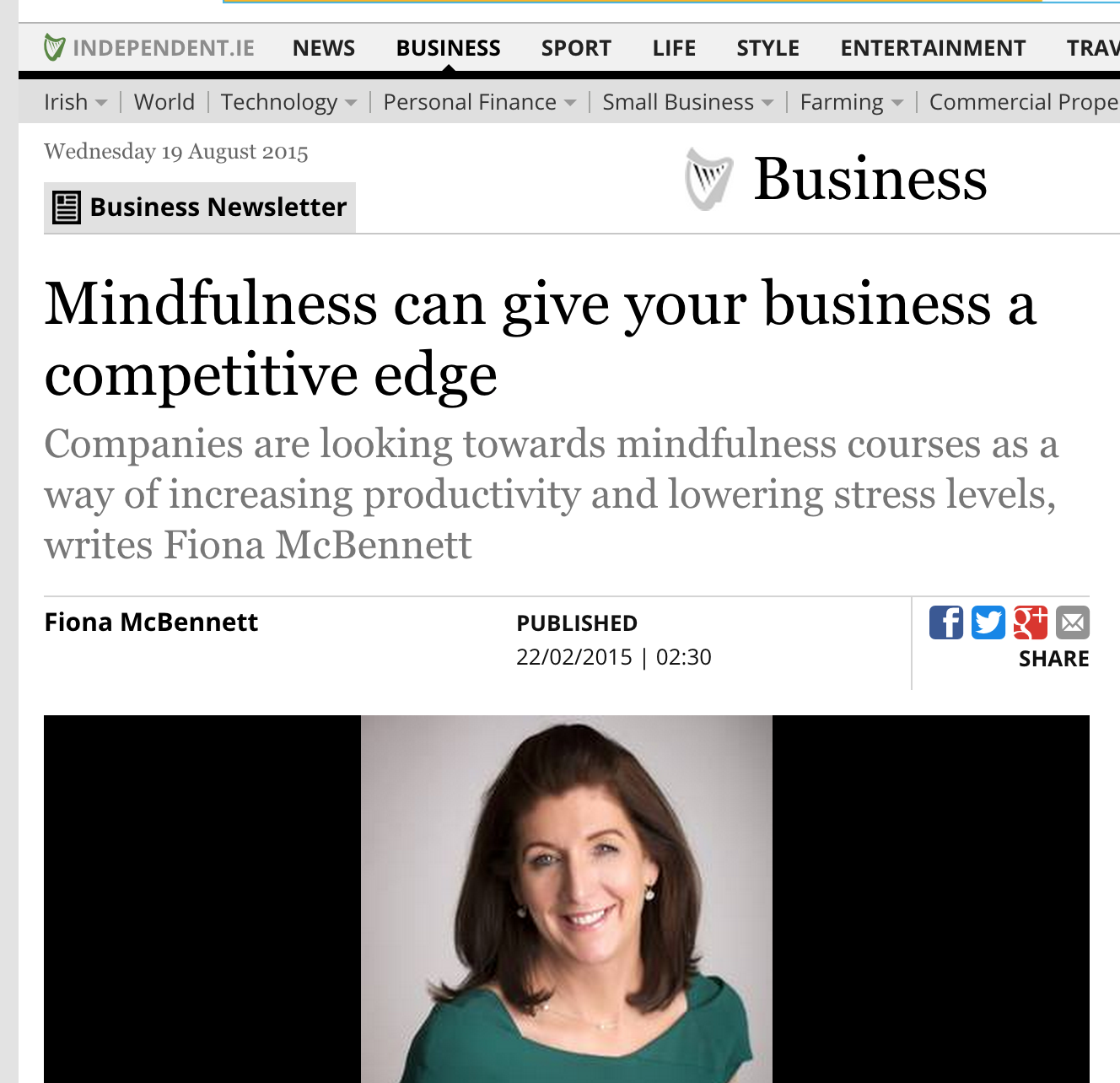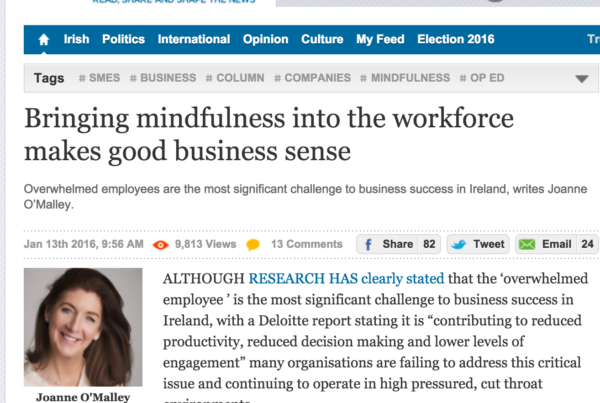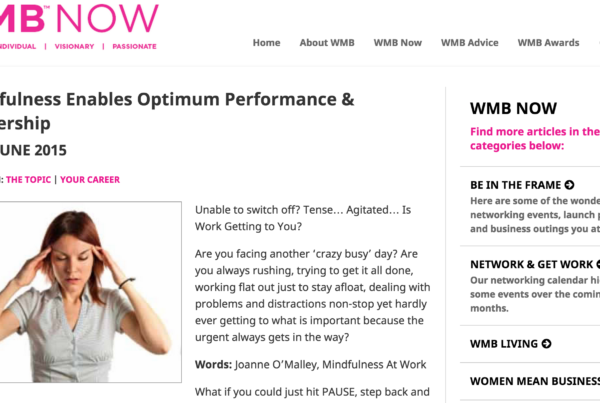Companies are looking towards mindfulness courses as a way of increasing productivity and lowering stress levels, writes Fiona McBennett
Mindfulness practitioner Joanne O’Malley delivers work-based mindfulness programmes to businesses across Ireland with her company, Mindfulness at Work.ie. Having previously worked in the corporate world, O’Malley has first-hand experience of how beneficial the practice can be.
I became very aware of how overloaded the working environment is in terms of technology and how it’s an environment that’s always on…
 Through my work with clients, I discovered that many people are looking for an antidote to stress and a way to enjoy their lives and operate more successfully. The biggest chunk of our lives is spent at work and it’s the place that needs mindfulness the most.”
Through my work with clients, I discovered that many people are looking for an antidote to stress and a way to enjoy their lives and operate more successfully. The biggest chunk of our lives is spent at work and it’s the place that needs mindfulness the most.”
Once viewed as a practice reserved for tree-hugging vegans, mindfulness has become the latest buzzword in the workplace.
Defined by the godfather of mindfulness, John Kabat-Zinn, as the “awareness that emerges through paying attention on purpose, in the present moment and non-judgementally”, the practice is now recognised by international employers as a way to increase employee productivity and lower stress levels, with many companies across the country now implementing training courses.Multi-national finance and business solutions provider, Fexco, recently offered a mindfulness course to its employees as part of a wide-ranging EAP programme in place at the company’s headquarters in Kerry.
the idea of simply paying attention to the present moment may appear straightforward – it takes time and patience to master it. Research has shown that our minds are wandering most of the time. We are really living very unconsciously,” explains O’Malley. “Even though the training of the mind is a simple practice in theory, it is not that easy to do. I find that people are very quick to realise that their mind is always either in the past or the future. This is a problem and it can mean that people are making rash choices and bad decisions at work.
Through practical exercises, such as watching the breath or being aware of sounds, O’Malley says that people can learn to pay closer attention to what is going on around them and improve their performance in the workplace as a result.
Due to the various devices we all have now, our attention spans are extremely limited. Through practising mindfulness, people can learn to calm their minds so that their ability to focus and concentrate on the task at hand improves. I think we are at a tipping point now. The cost of stress has become a reality and employers want their staff to be happier.
Alongside courses on topics such as nutrition and building resilience in the workplace, mindfulness proved to be a popular choice amongst many of the staff members, who took part in the programme over a series of weeks.
It was an optional course and we were oversubscribed. We had about 60 people in total taking part in the programme,” says Paula O’Sullivan, Head of Group HR at Fexco. The course focused on areas such as concentration and increasing productivity. Sometimes you need to concentrate and be present, particularly if there’s a meeting where a solution has to be found. Mindfulness can help employees to put themselves in the moment and focus on a solution and a positive outcome.
According to O’Sullivan, the course was well-received by employees, with many even deciding to pursue mindfulness trainings outside of work.
The feedback from employees was very positive. They reported feeling better able to manage their own daily stresses, inside and outside of work,” she says. A lot of people decided to do more extensive mindfulness courses outside of work and embark on their own mindfulness journey. We have found that since we ran the various programmes that employees are really genuinely interested in the various things that they can do to improve their overall well-being inside and outside of work
When it comes to looking after employees’ health and encouraging productivity, O’Sullivan says that a well-rounded approach works best and that companies need to do more than offer standalone mindfulness courses.
Mindfulness is becoming more popular in business and there is a bit of a buzz about it at the moment. I think that as long as it’s part of a collective of things that contribute to an overall work-life balance, then it’s very useful. Just focusing on mindfulness alone will not lead you to the holy grail of employee well-being. The kind of culture you have in your organisation can also impact on employees.
One company that has put mindfulness at the centre of their business plan is Vodafone Ireland. Last year, the company built a state-of-the-art wellness centre at their headquarters in Dublin, which focused on promoting physical, mental and emotional health.
We are a high-performing organisation. There is no down time as we don’t have a seasonality peak and we are always on for customers. For us, mindfulness and well-being links back to the business strategy, so it’s not peripheral, it’s core to ensuring that our employees are able to take care of themselves, while delivering for customers,” says Rachel Mooney, Vodafone Ireland’s HR director.
The company has also created a programme called ‘Think Well’, which is led by a team of ten staff members from across the organisation, trained to provide emotional and mental support for other members of staff. The team plan and organise various well-being programmes for employees and mindfulness has been a hot topic.
Mindfulness was being done in small pockets across the organisation by some members of the HR team who are trained in it, so they might have started off meetings with a bit of mindfulness. We went into a more programmatic approach last year when the Think Well team took it up and we now offer six-week programmes first thing in the morning. It has absolutely become part of the fabric of how we do things.
Mooney says that attitudes in the workplace are changing and while employers are more open to providing courses such as mindfulness, employees are also more willing to be involved.
We discovered that even the groups of people we might have expected to be slower at taking to things like mindfulness are actually finding it quite interesting. I feel that people are happier to talk about well-being, they seem to be more willing to discuss whatever is going on for them. Employers are appreciating that their staff are not just a set of skills now.
While mindfulness training is good for promoting good mental health, according to Mooney, it can also provide companies with an edge over their competitors.
There is a very good business reason why a business would create this kind of organisational culture. It can really help you and your community of employees to have an edge and at the end of the day – that’s what it’s all about.
You can contact Joanne O’Malley by email at info@mindfulnessatwork.ie or phone (087) 961 5901, www.mindfulnessatwork.ie
Sunday Indo Business

Read the original article in the Sunday Independent Feb 22 2015





